Dishonest Appropriation: Definition and Effects in Modern Law Regime
VerifiedAdded on 2023/04/07
|9
|1877
|189
AI Summary
This article provides a critical evaluation of the term dishonest appropriation and its effects in the modern law regime, with the help of leading case laws in English Legal History.
Contribute Materials
Your contribution can guide someone’s learning journey. Share your
documents today.
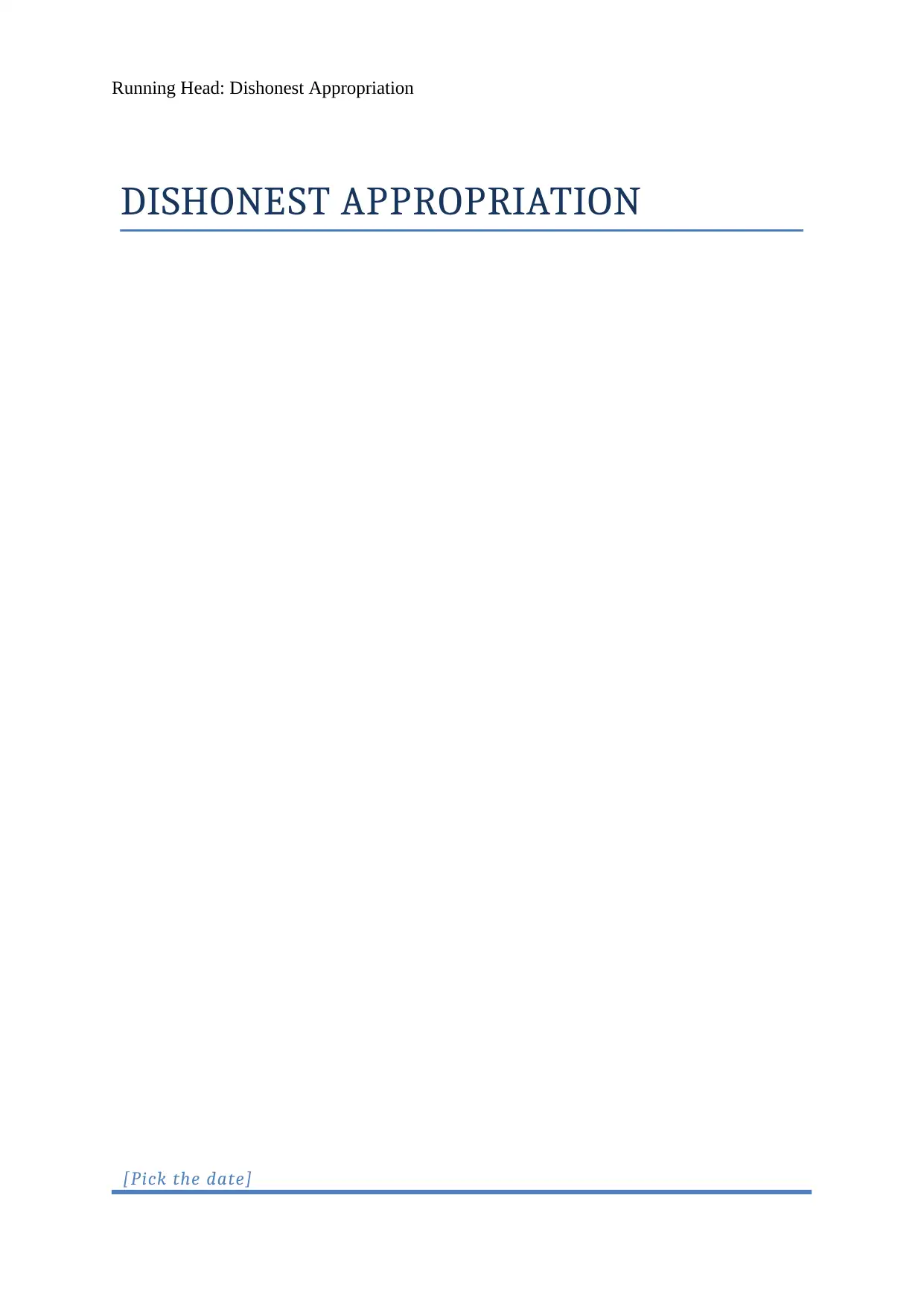
Running Head: Dishonest Appropriation
DISHONEST APPROPRIATION
[Pick the date]
DISHONEST APPROPRIATION
[Pick the date]
Secure Best Marks with AI Grader
Need help grading? Try our AI Grader for instant feedback on your assignments.
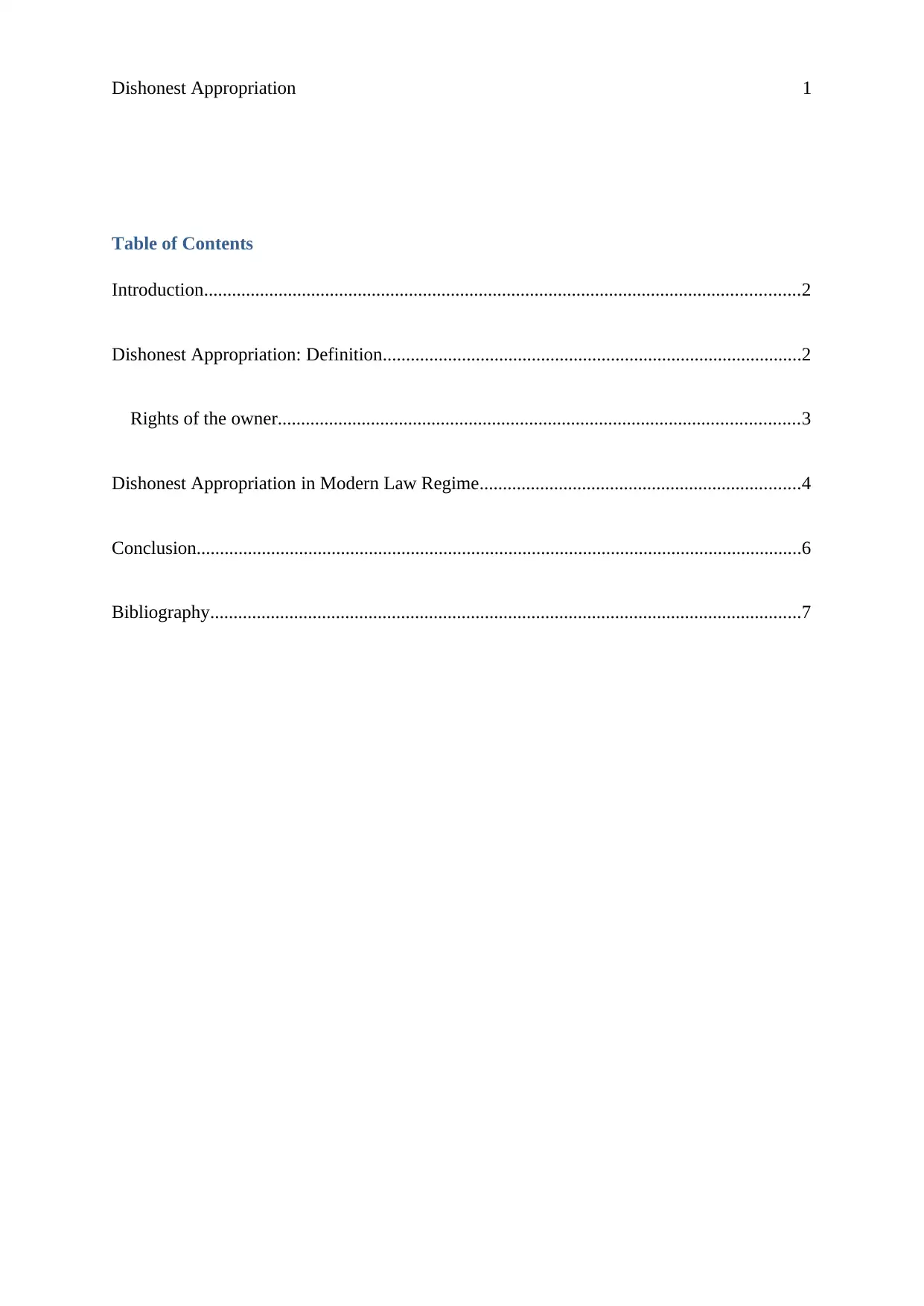
Dishonest Appropriation 1
Table of Contents
Introduction................................................................................................................................2
Dishonest Appropriation: Definition..........................................................................................2
Rights of the owner................................................................................................................3
Dishonest Appropriation in Modern Law Regime.....................................................................4
Conclusion..................................................................................................................................6
Bibliography...............................................................................................................................7
Table of Contents
Introduction................................................................................................................................2
Dishonest Appropriation: Definition..........................................................................................2
Rights of the owner................................................................................................................3
Dishonest Appropriation in Modern Law Regime.....................................................................4
Conclusion..................................................................................................................................6
Bibliography...............................................................................................................................7
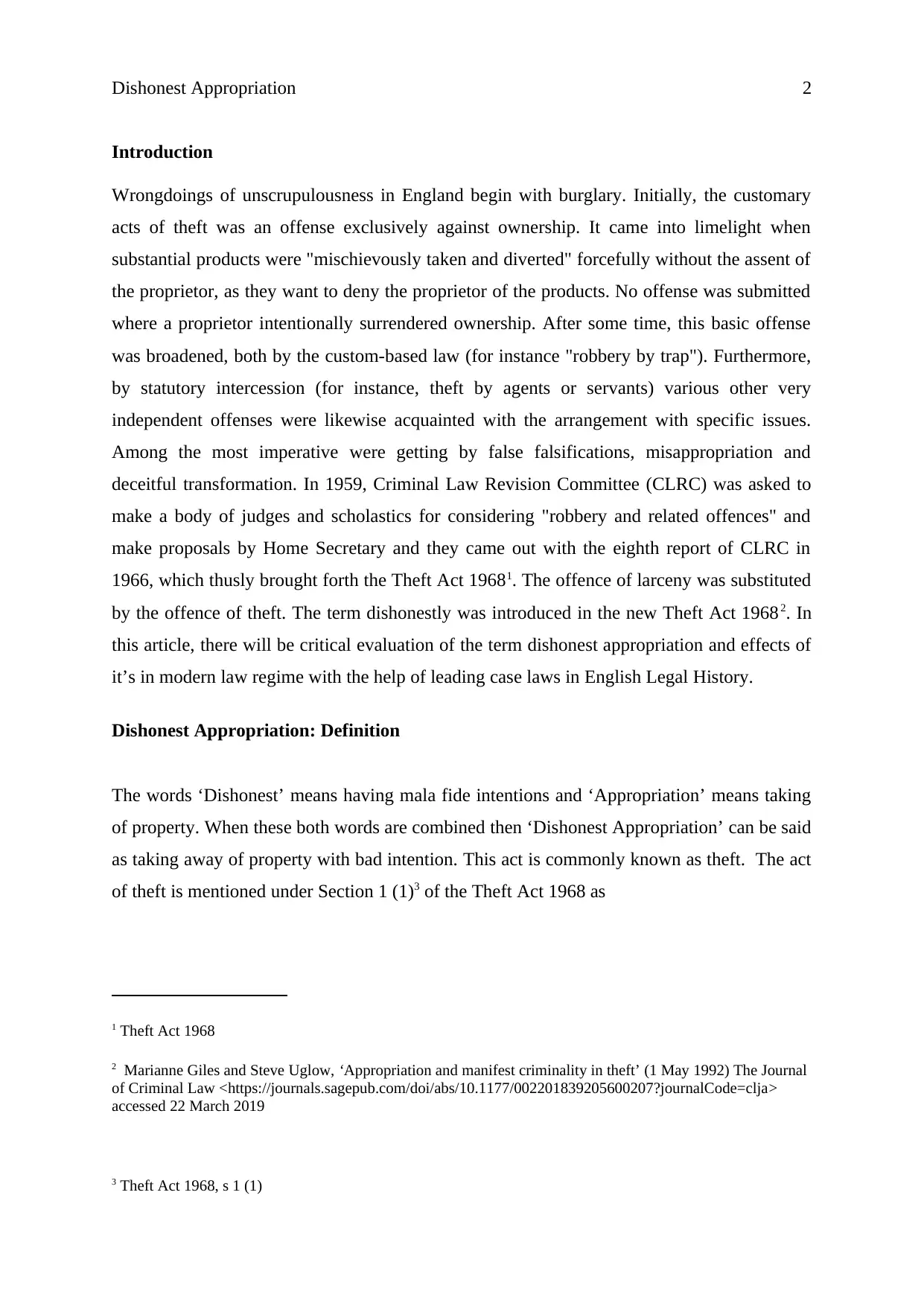
Dishonest Appropriation 2
Introduction
Wrongdoings of unscrupulousness in England begin with burglary. Initially, the customary
acts of theft was an offense exclusively against ownership. It came into limelight when
substantial products were "mischievously taken and diverted" forcefully without the assent of
the proprietor, as they want to deny the proprietor of the products. No offense was submitted
where a proprietor intentionally surrendered ownership. After some time, this basic offense
was broadened, both by the custom-based law (for instance "robbery by trap"). Furthermore,
by statutory intercession (for instance, theft by agents or servants) various other very
independent offenses were likewise acquainted with the arrangement with specific issues.
Among the most imperative were getting by false falsifications, misappropriation and
deceitful transformation. In 1959, Criminal Law Revision Committee (CLRC) was asked to
make a body of judges and scholastics for considering "robbery and related offences" and
make proposals by Home Secretary and they came out with the eighth report of CLRC in
1966, which thusly brought forth the Theft Act 19681. The offence of larceny was substituted
by the offence of theft. The term dishonestly was introduced in the new Theft Act 19682. In
this article, there will be critical evaluation of the term dishonest appropriation and effects of
it’s in modern law regime with the help of leading case laws in English Legal History.
Dishonest Appropriation: Definition
The words ‘Dishonest’ means having mala fide intentions and ‘Appropriation’ means taking
of property. When these both words are combined then ‘Dishonest Appropriation’ can be said
as taking away of property with bad intention. This act is commonly known as theft. The act
of theft is mentioned under Section 1 (1)3 of the Theft Act 1968 as
1 Theft Act 1968
2 Marianne Giles and Steve Uglow, ‘Appropriation and manifest criminality in theft’ (1 May 1992) The Journal
of Criminal Law <https://journals.sagepub.com/doi/abs/10.1177/002201839205600207?journalCode=clja>
accessed 22 March 2019
3 Theft Act 1968, s 1 (1)
Introduction
Wrongdoings of unscrupulousness in England begin with burglary. Initially, the customary
acts of theft was an offense exclusively against ownership. It came into limelight when
substantial products were "mischievously taken and diverted" forcefully without the assent of
the proprietor, as they want to deny the proprietor of the products. No offense was submitted
where a proprietor intentionally surrendered ownership. After some time, this basic offense
was broadened, both by the custom-based law (for instance "robbery by trap"). Furthermore,
by statutory intercession (for instance, theft by agents or servants) various other very
independent offenses were likewise acquainted with the arrangement with specific issues.
Among the most imperative were getting by false falsifications, misappropriation and
deceitful transformation. In 1959, Criminal Law Revision Committee (CLRC) was asked to
make a body of judges and scholastics for considering "robbery and related offences" and
make proposals by Home Secretary and they came out with the eighth report of CLRC in
1966, which thusly brought forth the Theft Act 19681. The offence of larceny was substituted
by the offence of theft. The term dishonestly was introduced in the new Theft Act 19682. In
this article, there will be critical evaluation of the term dishonest appropriation and effects of
it’s in modern law regime with the help of leading case laws in English Legal History.
Dishonest Appropriation: Definition
The words ‘Dishonest’ means having mala fide intentions and ‘Appropriation’ means taking
of property. When these both words are combined then ‘Dishonest Appropriation’ can be said
as taking away of property with bad intention. This act is commonly known as theft. The act
of theft is mentioned under Section 1 (1)3 of the Theft Act 1968 as
1 Theft Act 1968
2 Marianne Giles and Steve Uglow, ‘Appropriation and manifest criminality in theft’ (1 May 1992) The Journal
of Criminal Law <https://journals.sagepub.com/doi/abs/10.1177/002201839205600207?journalCode=clja>
accessed 22 March 2019
3 Theft Act 1968, s 1 (1)
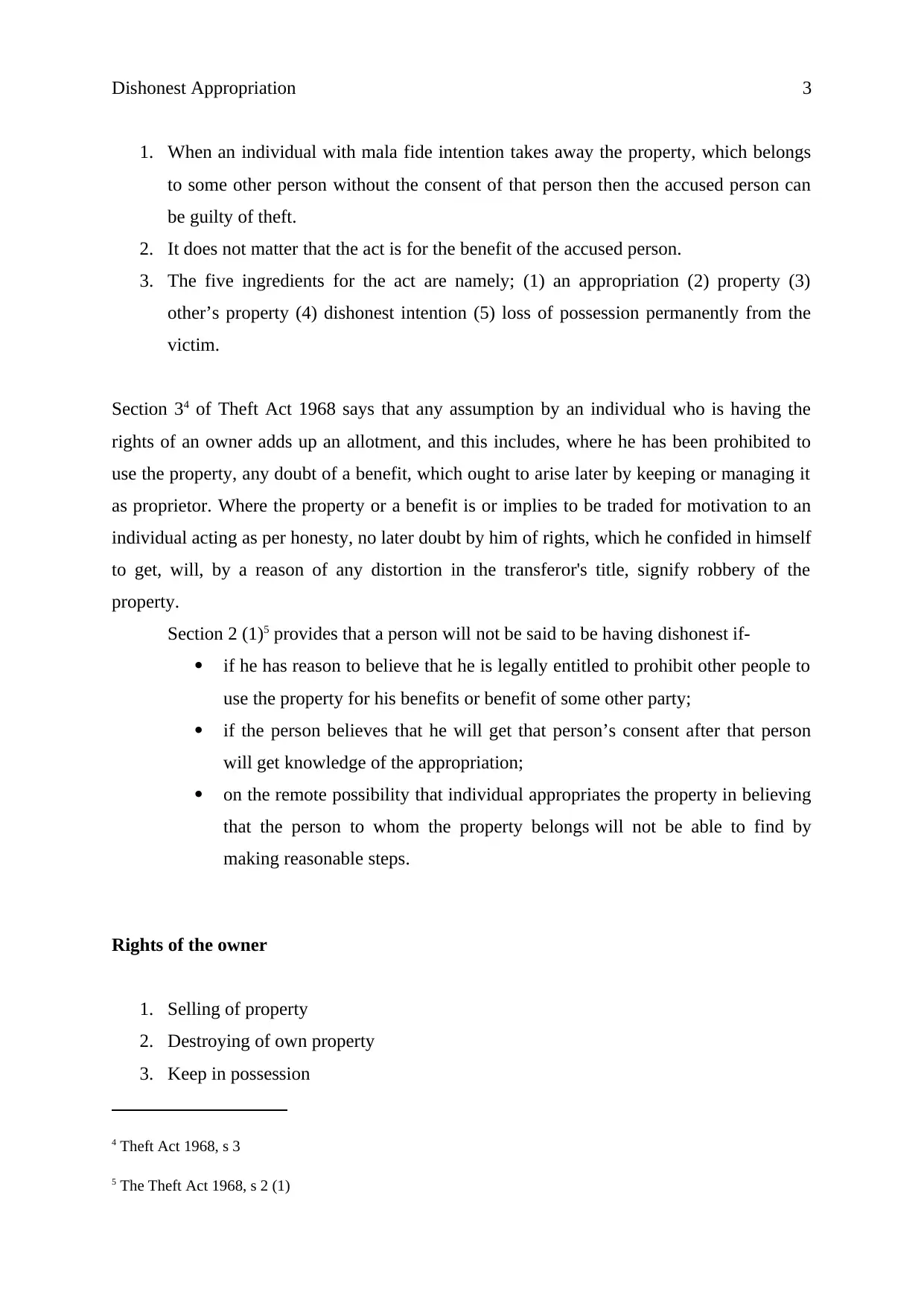
Dishonest Appropriation 3
1. When an individual with mala fide intention takes away the property, which belongs
to some other person without the consent of that person then the accused person can
be guilty of theft.
2. It does not matter that the act is for the benefit of the accused person.
3. The five ingredients for the act are namely; (1) an appropriation (2) property (3)
other’s property (4) dishonest intention (5) loss of possession permanently from the
victim.
Section 34 of Theft Act 1968 says that any assumption by an individual who is having the
rights of an owner adds up an allotment, and this includes, where he has been prohibited to
use the property, any doubt of a benefit, which ought to arise later by keeping or managing it
as proprietor. Where the property or a benefit is or implies to be traded for motivation to an
individual acting as per honesty, no later doubt by him of rights, which he confided in himself
to get, will, by a reason of any distortion in the transferor's title, signify robbery of the
property.
Section 2 (1)5 provides that a person will not be said to be having dishonest if-
if he has reason to believe that he is legally entitled to prohibit other people to
use the property for his benefits or benefit of some other party;
if the person believes that he will get that person’s consent after that person
will get knowledge of the appropriation;
on the remote possibility that individual appropriates the property in believing
that the person to whom the property belongs will not be able to find by
making reasonable steps.
Rights of the owner
1. Selling of property
2. Destroying of own property
3. Keep in possession
4 Theft Act 1968, s 3
5 The Theft Act 1968, s 2 (1)
1. When an individual with mala fide intention takes away the property, which belongs
to some other person without the consent of that person then the accused person can
be guilty of theft.
2. It does not matter that the act is for the benefit of the accused person.
3. The five ingredients for the act are namely; (1) an appropriation (2) property (3)
other’s property (4) dishonest intention (5) loss of possession permanently from the
victim.
Section 34 of Theft Act 1968 says that any assumption by an individual who is having the
rights of an owner adds up an allotment, and this includes, where he has been prohibited to
use the property, any doubt of a benefit, which ought to arise later by keeping or managing it
as proprietor. Where the property or a benefit is or implies to be traded for motivation to an
individual acting as per honesty, no later doubt by him of rights, which he confided in himself
to get, will, by a reason of any distortion in the transferor's title, signify robbery of the
property.
Section 2 (1)5 provides that a person will not be said to be having dishonest if-
if he has reason to believe that he is legally entitled to prohibit other people to
use the property for his benefits or benefit of some other party;
if the person believes that he will get that person’s consent after that person
will get knowledge of the appropriation;
on the remote possibility that individual appropriates the property in believing
that the person to whom the property belongs will not be able to find by
making reasonable steps.
Rights of the owner
1. Selling of property
2. Destroying of own property
3. Keep in possession
4 Theft Act 1968, s 3
5 The Theft Act 1968, s 2 (1)
Secure Best Marks with AI Grader
Need help grading? Try our AI Grader for instant feedback on your assignments.
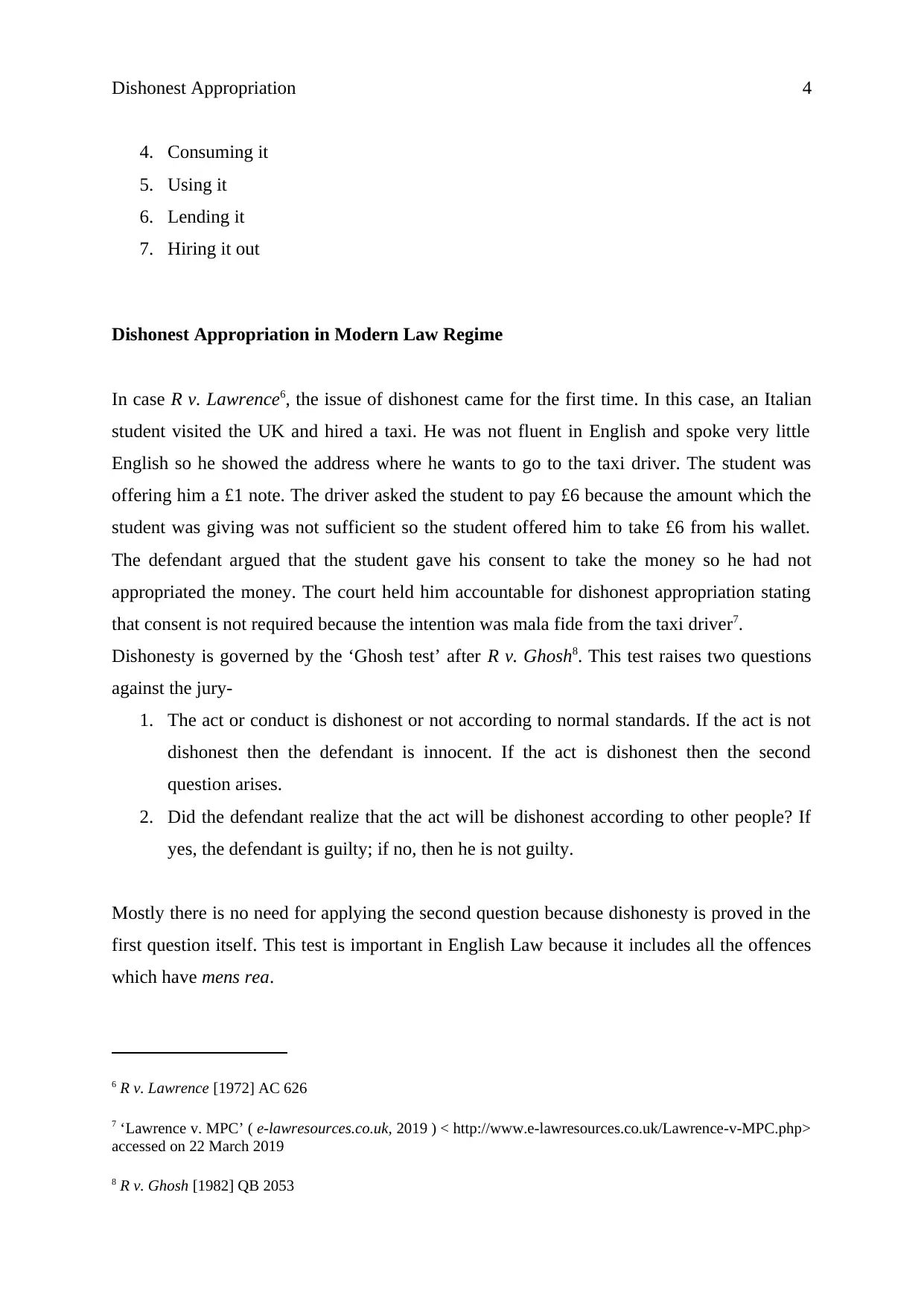
Dishonest Appropriation 4
4. Consuming it
5. Using it
6. Lending it
7. Hiring it out
Dishonest Appropriation in Modern Law Regime
In case R v. Lawrence6, the issue of dishonest came for the first time. In this case, an Italian
student visited the UK and hired a taxi. He was not fluent in English and spoke very little
English so he showed the address where he wants to go to the taxi driver. The student was
offering him a £1 note. The driver asked the student to pay £6 because the amount which the
student was giving was not sufficient so the student offered him to take £6 from his wallet.
The defendant argued that the student gave his consent to take the money so he had not
appropriated the money. The court held him accountable for dishonest appropriation stating
that consent is not required because the intention was mala fide from the taxi driver7.
Dishonesty is governed by the ‘Ghosh test’ after R v. Ghosh8. This test raises two questions
against the jury-
1. The act or conduct is dishonest or not according to normal standards. If the act is not
dishonest then the defendant is innocent. If the act is dishonest then the second
question arises.
2. Did the defendant realize that the act will be dishonest according to other people? If
yes, the defendant is guilty; if no, then he is not guilty.
Mostly there is no need for applying the second question because dishonesty is proved in the
first question itself. This test is important in English Law because it includes all the offences
which have mens rea.
6 R v. Lawrence [1972] AC 626
7 ‘Lawrence v. MPC’ ( e-lawresources.co.uk, 2019 ) < http://www.e-lawresources.co.uk/Lawrence-v-MPC.php>
accessed on 22 March 2019
8 R v. Ghosh [1982] QB 2053
4. Consuming it
5. Using it
6. Lending it
7. Hiring it out
Dishonest Appropriation in Modern Law Regime
In case R v. Lawrence6, the issue of dishonest came for the first time. In this case, an Italian
student visited the UK and hired a taxi. He was not fluent in English and spoke very little
English so he showed the address where he wants to go to the taxi driver. The student was
offering him a £1 note. The driver asked the student to pay £6 because the amount which the
student was giving was not sufficient so the student offered him to take £6 from his wallet.
The defendant argued that the student gave his consent to take the money so he had not
appropriated the money. The court held him accountable for dishonest appropriation stating
that consent is not required because the intention was mala fide from the taxi driver7.
Dishonesty is governed by the ‘Ghosh test’ after R v. Ghosh8. This test raises two questions
against the jury-
1. The act or conduct is dishonest or not according to normal standards. If the act is not
dishonest then the defendant is innocent. If the act is dishonest then the second
question arises.
2. Did the defendant realize that the act will be dishonest according to other people? If
yes, the defendant is guilty; if no, then he is not guilty.
Mostly there is no need for applying the second question because dishonesty is proved in the
first question itself. This test is important in English Law because it includes all the offences
which have mens rea.
6 R v. Lawrence [1972] AC 626
7 ‘Lawrence v. MPC’ ( e-lawresources.co.uk, 2019 ) < http://www.e-lawresources.co.uk/Lawrence-v-MPC.php>
accessed on 22 March 2019
8 R v. Ghosh [1982] QB 2053
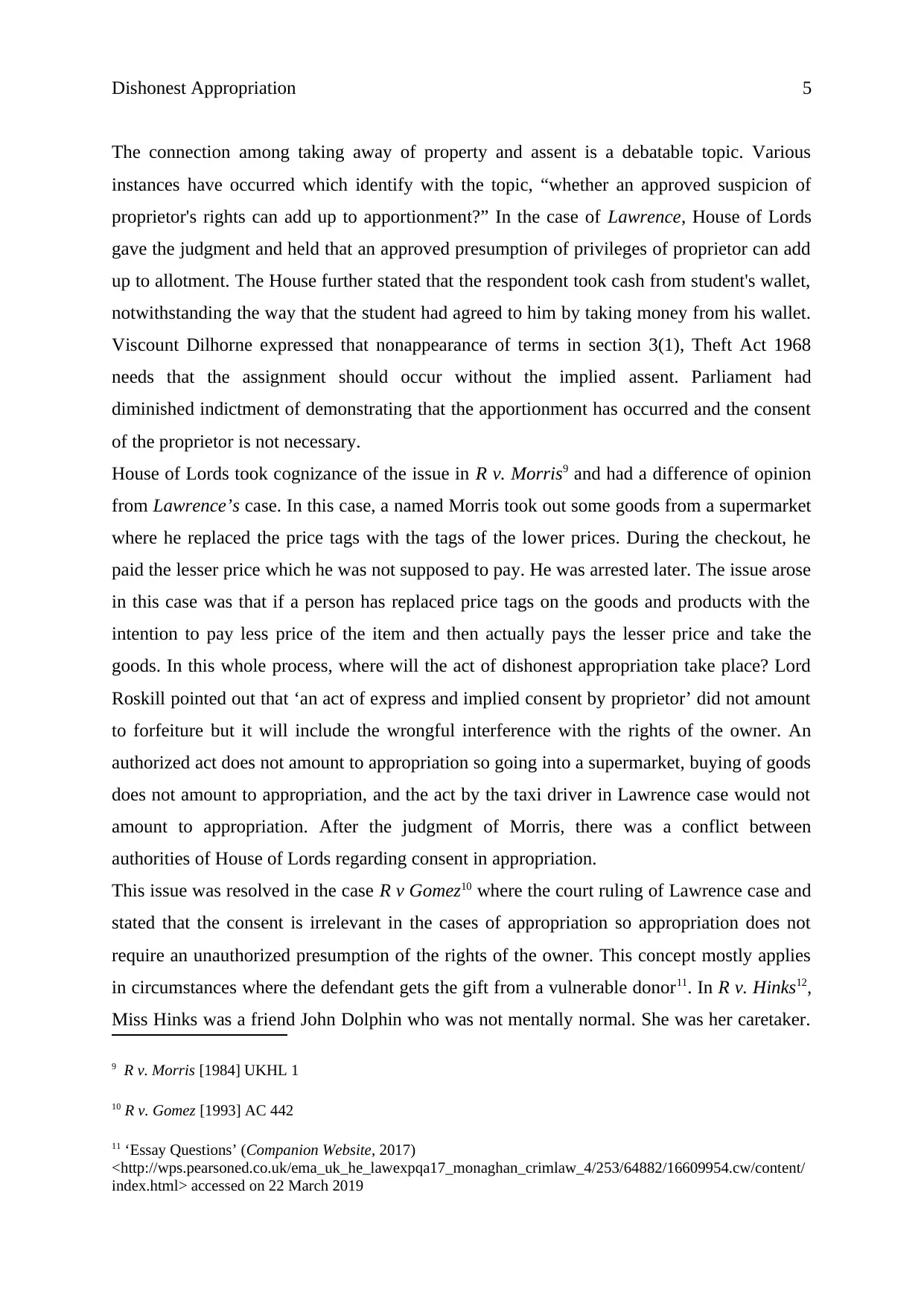
Dishonest Appropriation 5
The connection among taking away of property and assent is a debatable topic. Various
instances have occurred which identify with the topic, “whether an approved suspicion of
proprietor's rights can add up to apportionment?” In the case of Lawrence, House of Lords
gave the judgment and held that an approved presumption of privileges of proprietor can add
up to allotment. The House further stated that the respondent took cash from student's wallet,
notwithstanding the way that the student had agreed to him by taking money from his wallet.
Viscount Dilhorne expressed that nonappearance of terms in section 3(1), Theft Act 1968
needs that the assignment should occur without the implied assent. Parliament had
diminished indictment of demonstrating that the apportionment has occurred and the consent
of the proprietor is not necessary.
House of Lords took cognizance of the issue in R v. Morris9 and had a difference of opinion
from Lawrence’s case. In this case, a named Morris took out some goods from a supermarket
where he replaced the price tags with the tags of the lower prices. During the checkout, he
paid the lesser price which he was not supposed to pay. He was arrested later. The issue arose
in this case was that if a person has replaced price tags on the goods and products with the
intention to pay less price of the item and then actually pays the lesser price and take the
goods. In this whole process, where will the act of dishonest appropriation take place? Lord
Roskill pointed out that ‘an act of express and implied consent by proprietor’ did not amount
to forfeiture but it will include the wrongful interference with the rights of the owner. An
authorized act does not amount to appropriation so going into a supermarket, buying of goods
does not amount to appropriation, and the act by the taxi driver in Lawrence case would not
amount to appropriation. After the judgment of Morris, there was a conflict between
authorities of House of Lords regarding consent in appropriation.
This issue was resolved in the case R v Gomez10 where the court ruling of Lawrence case and
stated that the consent is irrelevant in the cases of appropriation so appropriation does not
require an unauthorized presumption of the rights of the owner. This concept mostly applies
in circumstances where the defendant gets the gift from a vulnerable donor11. In R v. Hinks12,
Miss Hinks was a friend John Dolphin who was not mentally normal. She was her caretaker.
9 R v. Morris [1984] UKHL 1
10 R v. Gomez [1993] AC 442
11 ‘Essay Questions’ (Companion Website, 2017)
<http://wps.pearsoned.co.uk/ema_uk_he_lawexpqa17_monaghan_crimlaw_4/253/64882/16609954.cw/content/
index.html> accessed on 22 March 2019
The connection among taking away of property and assent is a debatable topic. Various
instances have occurred which identify with the topic, “whether an approved suspicion of
proprietor's rights can add up to apportionment?” In the case of Lawrence, House of Lords
gave the judgment and held that an approved presumption of privileges of proprietor can add
up to allotment. The House further stated that the respondent took cash from student's wallet,
notwithstanding the way that the student had agreed to him by taking money from his wallet.
Viscount Dilhorne expressed that nonappearance of terms in section 3(1), Theft Act 1968
needs that the assignment should occur without the implied assent. Parliament had
diminished indictment of demonstrating that the apportionment has occurred and the consent
of the proprietor is not necessary.
House of Lords took cognizance of the issue in R v. Morris9 and had a difference of opinion
from Lawrence’s case. In this case, a named Morris took out some goods from a supermarket
where he replaced the price tags with the tags of the lower prices. During the checkout, he
paid the lesser price which he was not supposed to pay. He was arrested later. The issue arose
in this case was that if a person has replaced price tags on the goods and products with the
intention to pay less price of the item and then actually pays the lesser price and take the
goods. In this whole process, where will the act of dishonest appropriation take place? Lord
Roskill pointed out that ‘an act of express and implied consent by proprietor’ did not amount
to forfeiture but it will include the wrongful interference with the rights of the owner. An
authorized act does not amount to appropriation so going into a supermarket, buying of goods
does not amount to appropriation, and the act by the taxi driver in Lawrence case would not
amount to appropriation. After the judgment of Morris, there was a conflict between
authorities of House of Lords regarding consent in appropriation.
This issue was resolved in the case R v Gomez10 where the court ruling of Lawrence case and
stated that the consent is irrelevant in the cases of appropriation so appropriation does not
require an unauthorized presumption of the rights of the owner. This concept mostly applies
in circumstances where the defendant gets the gift from a vulnerable donor11. In R v. Hinks12,
Miss Hinks was a friend John Dolphin who was not mentally normal. She was her caretaker.
9 R v. Morris [1984] UKHL 1
10 R v. Gomez [1993] AC 442
11 ‘Essay Questions’ (Companion Website, 2017)
<http://wps.pearsoned.co.uk/ema_uk_he_lawexpqa17_monaghan_crimlaw_4/253/64882/16609954.cw/content/
index.html> accessed on 22 March 2019
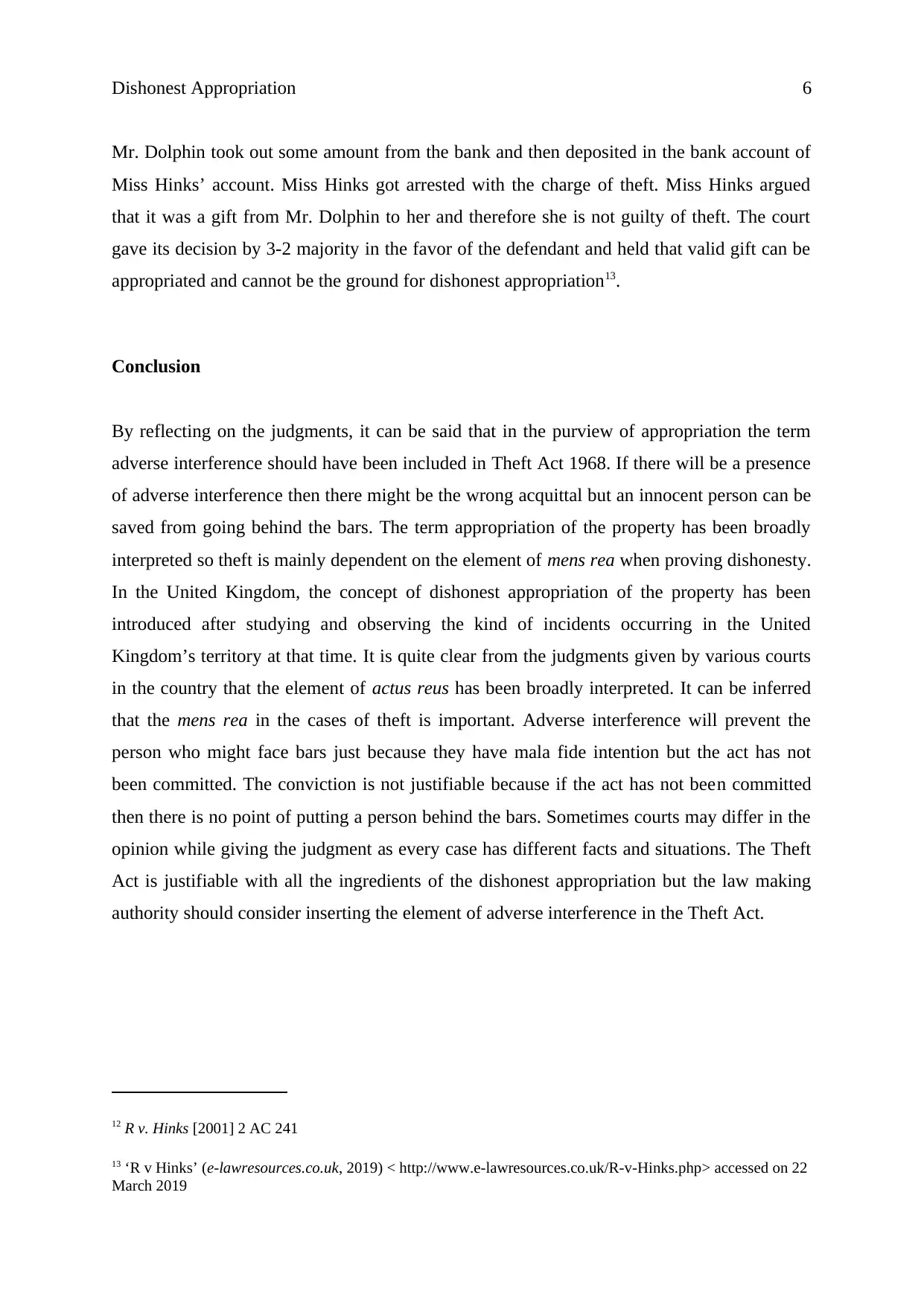
Dishonest Appropriation 6
Mr. Dolphin took out some amount from the bank and then deposited in the bank account of
Miss Hinks’ account. Miss Hinks got arrested with the charge of theft. Miss Hinks argued
that it was a gift from Mr. Dolphin to her and therefore she is not guilty of theft. The court
gave its decision by 3-2 majority in the favor of the defendant and held that valid gift can be
appropriated and cannot be the ground for dishonest appropriation13.
Conclusion
By reflecting on the judgments, it can be said that in the purview of appropriation the term
adverse interference should have been included in Theft Act 1968. If there will be a presence
of adverse interference then there might be the wrong acquittal but an innocent person can be
saved from going behind the bars. The term appropriation of the property has been broadly
interpreted so theft is mainly dependent on the element of mens rea when proving dishonesty.
In the United Kingdom, the concept of dishonest appropriation of the property has been
introduced after studying and observing the kind of incidents occurring in the United
Kingdom’s territory at that time. It is quite clear from the judgments given by various courts
in the country that the element of actus reus has been broadly interpreted. It can be inferred
that the mens rea in the cases of theft is important. Adverse interference will prevent the
person who might face bars just because they have mala fide intention but the act has not
been committed. The conviction is not justifiable because if the act has not been committed
then there is no point of putting a person behind the bars. Sometimes courts may differ in the
opinion while giving the judgment as every case has different facts and situations. The Theft
Act is justifiable with all the ingredients of the dishonest appropriation but the law making
authority should consider inserting the element of adverse interference in the Theft Act.
12 R v. Hinks [2001] 2 AC 241
13 ‘R v Hinks’ (e-lawresources.co.uk, 2019) < http://www.e-lawresources.co.uk/R-v-Hinks.php> accessed on 22
March 2019
Mr. Dolphin took out some amount from the bank and then deposited in the bank account of
Miss Hinks’ account. Miss Hinks got arrested with the charge of theft. Miss Hinks argued
that it was a gift from Mr. Dolphin to her and therefore she is not guilty of theft. The court
gave its decision by 3-2 majority in the favor of the defendant and held that valid gift can be
appropriated and cannot be the ground for dishonest appropriation13.
Conclusion
By reflecting on the judgments, it can be said that in the purview of appropriation the term
adverse interference should have been included in Theft Act 1968. If there will be a presence
of adverse interference then there might be the wrong acquittal but an innocent person can be
saved from going behind the bars. The term appropriation of the property has been broadly
interpreted so theft is mainly dependent on the element of mens rea when proving dishonesty.
In the United Kingdom, the concept of dishonest appropriation of the property has been
introduced after studying and observing the kind of incidents occurring in the United
Kingdom’s territory at that time. It is quite clear from the judgments given by various courts
in the country that the element of actus reus has been broadly interpreted. It can be inferred
that the mens rea in the cases of theft is important. Adverse interference will prevent the
person who might face bars just because they have mala fide intention but the act has not
been committed. The conviction is not justifiable because if the act has not been committed
then there is no point of putting a person behind the bars. Sometimes courts may differ in the
opinion while giving the judgment as every case has different facts and situations. The Theft
Act is justifiable with all the ingredients of the dishonest appropriation but the law making
authority should consider inserting the element of adverse interference in the Theft Act.
12 R v. Hinks [2001] 2 AC 241
13 ‘R v Hinks’ (e-lawresources.co.uk, 2019) < http://www.e-lawresources.co.uk/R-v-Hinks.php> accessed on 22
March 2019
Paraphrase This Document
Need a fresh take? Get an instant paraphrase of this document with our AI Paraphraser
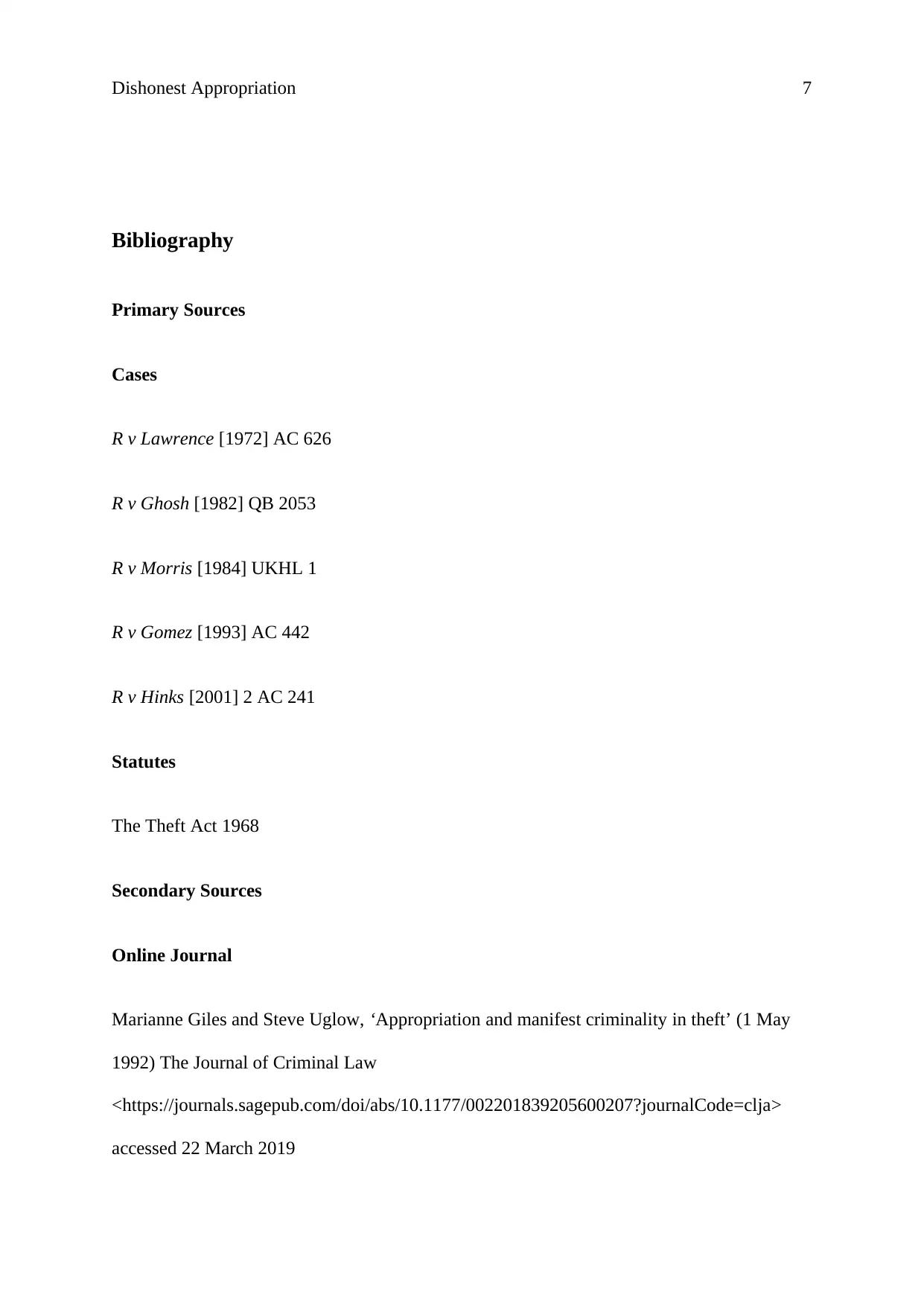
Dishonest Appropriation 7
Bibliography
Primary Sources
Cases
R v Lawrence [1972] AC 626
R v Ghosh [1982] QB 2053
R v Morris [1984] UKHL 1
R v Gomez [1993] AC 442
R v Hinks [2001] 2 AC 241
Statutes
The Theft Act 1968
Secondary Sources
Online Journal
Marianne Giles and Steve Uglow, ‘Appropriation and manifest criminality in theft’ (1 May
1992) The Journal of Criminal Law
<https://journals.sagepub.com/doi/abs/10.1177/002201839205600207?journalCode=clja>
accessed 22 March 2019
Bibliography
Primary Sources
Cases
R v Lawrence [1972] AC 626
R v Ghosh [1982] QB 2053
R v Morris [1984] UKHL 1
R v Gomez [1993] AC 442
R v Hinks [2001] 2 AC 241
Statutes
The Theft Act 1968
Secondary Sources
Online Journal
Marianne Giles and Steve Uglow, ‘Appropriation and manifest criminality in theft’ (1 May
1992) The Journal of Criminal Law
<https://journals.sagepub.com/doi/abs/10.1177/002201839205600207?journalCode=clja>
accessed 22 March 2019
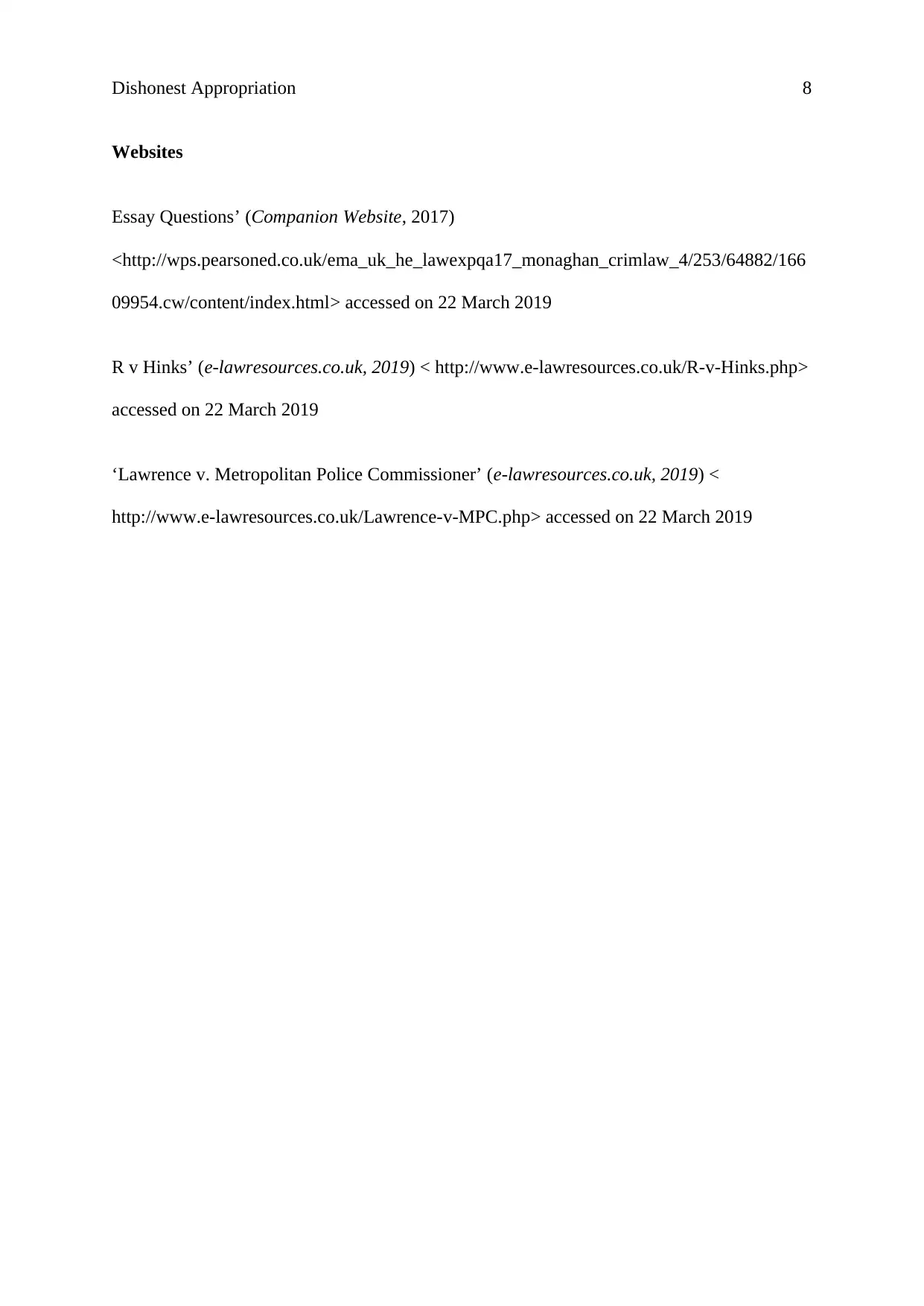
Dishonest Appropriation 8
Websites
Essay Questions’ (Companion Website, 2017)
<http://wps.pearsoned.co.uk/ema_uk_he_lawexpqa17_monaghan_crimlaw_4/253/64882/166
09954.cw/content/index.html> accessed on 22 March 2019
R v Hinks’ (e-lawresources.co.uk, 2019) < http://www.e-lawresources.co.uk/R-v-Hinks.php>
accessed on 22 March 2019
‘Lawrence v. Metropolitan Police Commissioner’ (e-lawresources.co.uk, 2019) <
http://www.e-lawresources.co.uk/Lawrence-v-MPC.php> accessed on 22 March 2019
Websites
Essay Questions’ (Companion Website, 2017)
<http://wps.pearsoned.co.uk/ema_uk_he_lawexpqa17_monaghan_crimlaw_4/253/64882/166
09954.cw/content/index.html> accessed on 22 March 2019
R v Hinks’ (e-lawresources.co.uk, 2019) < http://www.e-lawresources.co.uk/R-v-Hinks.php>
accessed on 22 March 2019
‘Lawrence v. Metropolitan Police Commissioner’ (e-lawresources.co.uk, 2019) <
http://www.e-lawresources.co.uk/Lawrence-v-MPC.php> accessed on 22 March 2019
1 out of 9
Related Documents
Your All-in-One AI-Powered Toolkit for Academic Success.
+13062052269
info@desklib.com
Available 24*7 on WhatsApp / Email
![[object Object]](/_next/static/media/star-bottom.7253800d.svg)
Unlock your academic potential
© 2024 | Zucol Services PVT LTD | All rights reserved.





